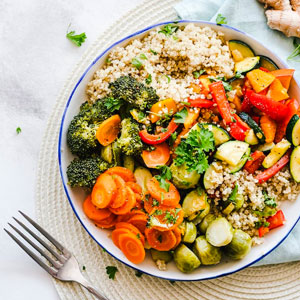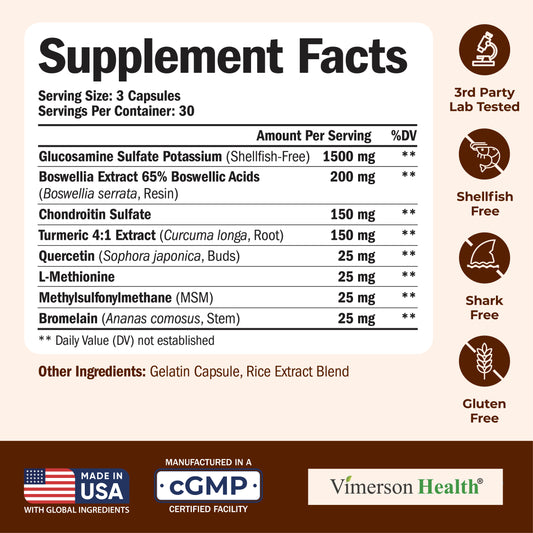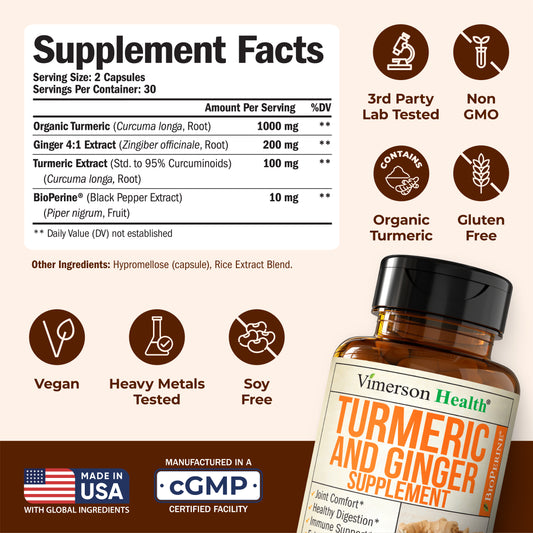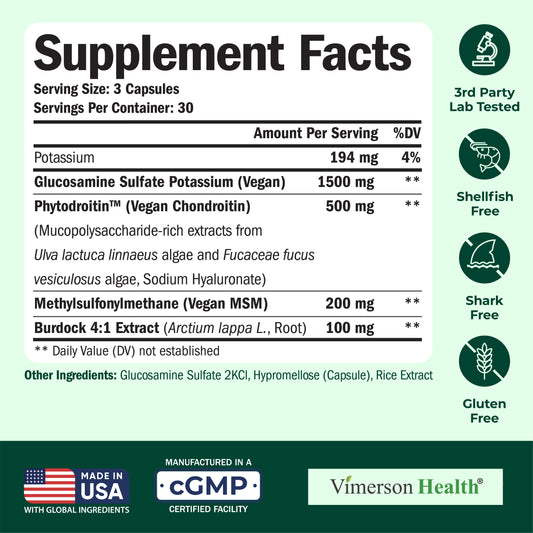-
Glucosamine Chondroitin MSM – Joint Support Supplement for Women and Men with Glucosamine Sulfate 1500 mg, Chondroitin and MSM – for Cartilage, Joint Health and Flexibility – 90 Capsules
Vendor:Vimerson HealthRegular price $28.97Regular priceUnit price per -
Turmeric Curcumin Supplement with Black Pepper Extract - High Potency Organic Turmeric 1200mg & 95% Curcuminoids for Joint & Digestive Health - Joint Support Supplement - 60 Vegan Curcuma Capsules
Vendor:Vimerson HealthRegular price $23.97Regular priceUnit price per -
Turmeric Curcumin Supplement with Ginger Root for Joint Support, Digestive & Gut Health - Contains Organic Turmeric Curcumin with Black Pepper (Bioperine) for Enhanced Absorption - 60 Capsules
Vendor:Vimerson HealthRegular price $21.97Regular priceUnit price per -
Turmeric Curcumin Supplement with Black Pepper Extract - High Potency Organic Turmeric 1400mg & 95% Curcuminoids for Joint & Digestive Health - Joint Support Supplement - 60 Vegan Curcuma Capsules
Vendor:Vimerson HealthRegular price $24.97Regular priceUnit price per -
Turmeric Curcumin Supplement with Boswellia Serrata, Ginger, Organic Turmeric Powder & Bioperine for Max Absorption - 95% Curcuminoids Turmeric Supplement - 60 Tumeric Boswellia Extract Capsules
Vendor:Vimerson HealthRegular price $20.97Regular priceUnit price per -
Quercetin with Bromelain Turmeric Curcumin Supplement – Allergy Relief, Immune & Joint Support – Organic Turmeric Supplement w/ Bioperine for Enhanced Absorption, 60 Quercetin 500mg Capsules
Vendor:Vimerson HealthRegular price $24.97Regular priceUnit price per -
Turmeric Curcumin Supplement with Hemp Seeds & Lemon Balm Extract – Joint Health & Mobility – with Black Pepper for Absorption – Natural Joint Supplement for Men & Women
Vendor:Vimerson HealthRegular price $23.97Regular priceUnit price per -
Saffron Supplements – 89mg Saffron Extract and 1000mg Tumeric Blend – Turmeric Supplement with Ceylon Cinnamon and Cardamom for Mood, Memory & Eye Health – Joint Supplements for Women & Men – 60 Count
Vendor:Vimerson HealthRegular price $23.97Regular priceUnit price per -
Glucosamine Sulfate with Hyaluronic Acid, Boswellia, Black Pepper & MSM Supplement – 5-in-1 Joint Supplements for Men and Women – Joint Health, Mobility & Bone Strength – FSA Eligible 60 Caps
Vendor:Vimerson HealthRegular price $24.97Regular priceUnit price per -
Moringa Turmeric Supplement for Joint Health, Gut Health, Energy and Immune Support – Total Wellness Formula with Tumeric Moringa Pure Capsules – Turmeric Curcumin with Black Pepper – 60 Count
Vendor:Vimerson HealthRegular price $22.97Regular priceUnit price per -
Ashwagandha Organic Turmeric Curcumin Supplement with Ginger Root & Black Pepper – Joint Health, Energy & Immune Support – Antioxidant Blend with 95% Curcuminoids – 60 Capsules
Vendor:Vimerson HealthRegular price $22.97Regular priceUnit price per -
Glucosamine Chondroitin MSM with Hydrolyzed Collagen Peptides - Joint Support Supplement with Quercetin, Bromelain & Boswellia Extract - Collagen pills for Hair Skin Nails - FSA Eligible 120 Caps
Vendor:Vimerson HealthRegular price $25.97Regular priceUnit price per -
Melatonin 3mg Sleep Aid with L-Theanine & Valerian Root – Turmeric Curcumin Supplement with Ginger & Black Pepper – Organic Turmeric Supplement for Sleep, Calm and Stress Relief Support – 60 Capsules
Vendor:Vimerson HealthRegular price $22.97Regular priceUnit price per -
Organic Apple Cider Vinegar with Turmeric Curcumin Supplement & Ginger for Digestive Health, Metabolism, Energy & Joint Support - Organic Turmeric & Apple Cider Vinegar Capsules. 60 Vegan Non-GMO Caps
Vendor:Vimerson HealthRegular price $20.97Regular priceUnit price per -
Glucosamine Chondroitin with Vitamin D3 2000IU – FSA Eligible Joint Supplements for Men & Women – Joint Health, Hair Skin Nails, Bone Health & Comfort with MSM, Vit D, Bromelain & Boswellia – 120 Tabs
Vendor:Vimerson HealthRegular price $26.97Regular priceUnit price per -
Glucosamine Chondroitin MSM – Joint Support Supplement for Women and Men with Glucosamine Sulfate 1500 mg, Chondroitin and MSM – for Cartilage, Joint Health and Flexibility – 90 Capsules, Vegan
Vendor:Vimerson HealthRegular price $29.97Regular priceUnit price per -
Organic Spirulina and Chlorella Capsules - Spirulina Capsules with Chlorella Powder for Immune, Antioxidant & Energy Support. Nutritious Super Green. Vegan & Non-GMO. Third Party Tested. 60 Caps
Vendor:Vimerson HealthRegular price $23.97Regular priceUnit price per -
Ginkgo Biloba and Turmeric Curcumin Supplement with Black Pepper & Organic Tumeric – Natural Turmeric Supplement for Focus, Memory, Joint & Brain Health – 60 Vegan Ginko Biloba Capsules with Curcuma
Vendor:Vimerson HealthRegular price $22.97Regular priceUnit price per -
Turmeric Curcumin Supplement with Green Tea Extract (ECGC) & Vitamin C for Joint Health, Energy & Inflammation Balance - Organic Tumeric Curcumin with Black Pepper - Gluten-Free, Non-GMO - 60 Capsules
Vendor:Vimerson HealthRegular price $23.97Regular priceUnit price per -
Turmeric Supplement & Chamomile Capsules for Sleep - Organic Turmeric Sleep Supplement with Chamomile Flowers Extract (Manzanilla) - Relaxation & Stress Support - Joint & Digestive Health. 60 Capsules
Vendor:Vimerson HealthRegular price $23.97Regular priceUnit price per
UNDERSTANDING INFLAMMATION
Inflammation is a natural defense mechanism of the body that plays a crucial role in protecting us from harmful pathogens and initiating the healing process after an injury. When the immune system detects foreign invaders or tissue damage, it triggers an inflammatory response, leading to redness, swelling, and pain.

THE IMPACT OF LIFESTYLE ON INFLAMMATION
➤ Several factors influence the body's inflammation levels, and lifestyle choices play a significant role. Diet, physical activity, stress levels, sleep patterns, and exposure to environmental toxins all contribute to the inflammatory response in our bodies.
THE IMPORTANCE OF INFLAMMATION BALANCE: THE KEY TO OPTIMAL HEALTH
Maintaining a healthy inflammatory response is crucial for supporting overall health and well-being as it helps promote proper functioning of the immune system, allowing individuals to lead a balanced lifestyle. Additionally, individuals may experience improved energy levels and enhanced vitality, contributing to their overall quality of life.
4 FACTORS AFFECTING INFLAMMATION BALANCE
-

DIET AND NUTRITION
The food we eat can either promote or reduce inflammation. Consuming a diet high in processed foods, sugar, and unhealthy fats may contribute to inflammation, while a diet rich in fruits, vegetables, and anti-inflammatory foods can help maintain balance.
-

EXERCISE AND PHYSICAL ACTIVITY
Regular exercise has anti-inflammatory effects on the body. Engaging in physical activity reduces inflammation markers and supports overall health.
-

STRESS AND MENTAL HEALTH
Stress can trigger inflammation and impact our immune system. Managing stress through relaxation techniques and mindfulness can help maintain inflammation balance.
-

ENVIRONMENTAL FACTORS
Exposure to pollutants and toxins in the environment can trigger inflammation. Creating a clean and healthy living environment is crucial for inflammation regulation.
IMPACT OF INFLAMMATION ON THE BODY
Inflammation not only affects specific areas of the body but can also have systemic effects. Chronic inflammation can weaken the immune system, impair organ function, and increase the risk of various health conditions.
THE 6 MOST IMPORTANT NEEDS FOR A HEALTHY INFLAMMATORY RESPONSE
CHOOSE MY SUPPLEMENTGOING DEEPER INTO EVERY NEED OF THE INFLAMMATORY RESPONSE

✦ DIET AND INFLAMMATION BALANCE
A well-balanced diet plays a crucial role in managing inflammation in the body. Certain foods can either promote or reduce inflammation, making dietary choices essential for maintaining inflammation balance.
- Emphasize a plant-based diet rich in fruits, vegetables, whole grains, nuts, and seeds, as these foods are high in antioxidants and anti-inflammatory compounds.
- Consume healthy fats from sources like olive oil, avocados, and fatty fish, which contain omega-3 fatty acids with anti-inflammatory properties.
- Limit the intake of processed and sugary foods, as they can contribute to inflammation.
- Choose lean proteins, such as poultry, fish, and legumes, over red and processed meats, which may increase inflammation.
- Consider an anti-inflammatory diet, such as the Mediterranean or DASH diet, which focuses on whole foods and minimizes processed options.
✦ EXERCISE AS AN INFLAMMATION BALANCE AGENT
Regular physical activity has been shown to modulate the body's inflammatory response, helping to maintain inflammation balance.
- Engage in both aerobic and strength-training exercises regularly for optimal benefits.
- Aim for at least 150 minutes of moderate-intensity exercise or 75 minutes of vigorous exercise per week.
- Exercise can reduce levels of pro-inflammatory markers in the body while promoting anti-inflammatory substances.
- Be consistent with your exercise routine, as regularity is essential for managing inflammation.
- Listen to your body and avoid overtraining, which may lead to increased inflammation.
- Warm-up before exercise and cool down afterward to reduce the risk of injury and inflammation.
- Combine exercise with other inflammation-balancing practices like stress management and a healthy diet for maximum impact.
✦ STRESS MANAGEMENT AND INFLAMMATION
Chronic stress can trigger a heightened inflammatory response in the body, making stress management crucial for inflammation balance.
- Practice relaxation techniques such as meditation, deep breathing, or yoga to reduce stress and inflammation.
- Engage in regular physical activity, as exercise can alleviate stress and inflammation.
- Get enough sleep, as quality rest supports the body's stress response and immune function.
- Prioritize self-care and set aside time for activities that bring joy and relaxation.
- Seek social support from friends, family, or support groups to help cope with stress.
- Avoid excessive alcohol consumption and smoking, as they can increase inflammation and worsen stress-related health issues.
- Consider counseling or therapy if stress levels are significantly impacting daily life and well-being.
- Create a balanced daily routine that includes time for work, rest, and leisure to manage stress effectively.
✦ SLEEP QUALITY AND INFLAMMATION
Adequate and restful sleep is essential for maintaining inflammation balance and overall health.
- Aim for 7-9 hours of sleep per night to support the body's natural repair and recovery processes.
- Maintain a consistent sleep schedule, even on weekends, to regulate the body's internal clock.
- Create a calming bedtime routine to signal the body that it's time to sleep.
- Keep the sleep environment comfortable, dark, and quiet to promote restful sleep.
- Limit caffeine and electronic device use before bedtime, as they can disrupt sleep patterns.
- Manage stress through relaxation techniques to improve sleep quality.
- If sleep disturbances persist, consider seeking guidance from a healthcare professional to address underlying issues.
- Prioritize sleep as an integral part of inflammation-balancing practices.
✦ INFLAMMATION AND GUT HEALTH
The gut and its microbiome play a significant role in inflammation balance. Maintaining gut health is crucial for modulating inflammation in the body.
- Consume a diverse range of fiber-rich fruits, vegetables, and whole grains to nourish beneficial gut bacteria.
- Include fermented foods like yogurt, kefir, sauerkraut, and kimchi to promote a healthy gut microbiome.
- Avoid excessive consumption of processed and sugary foods, which can disrupt gut health.
- Consider probiotic supplements to support gut microbiome balance inflammation.*
- Stay hydrated and drink plenty of water to maintain gut health and promote regular bowel movements.
- Manage stress, as chronic stress can negatively impact gut health and inflammation.
- Seek medical advice if experiencing persistent digestive issues or gut-related inflammation.
✦ INFLAMMATION BALANCE SUPPLEMENTS
Certain supplements may complement inflammation-balancing efforts, although they should not replace a healthy lifestyle and dietary choices.*
- Omega-3 fatty acids, commonly found in fish oil supplements, have inflammation balance properties.*
- Curcumin, derived from turmeric, may help balance inflammation and support overall health.*
- Ginger supplements may have inflammation balance effects and aid digestion.*
- Quercetin, a flavonoid found in fruits and vegetables, can help balance the body's inflammatory response.*
- Probiotic supplements can support gut health and indirectly influence inflammation.*
- Always consult with a healthcare professional before starting any new supplement regimen, as some may interact with medications or have side effects.
- Supplements should be used as part of a comprehensive approach that includes a balanced diet, exercise, stress management, and quality sleep.
✦ SMOKING-ALCOHOL AND INFLAMMATION
Smoking and excessive alcohol consumption can promote inflammation in the body and lead to various health issues.
- Smoking tobacco releases harmful toxins that trigger inflammation and damage tissues.
- Quitting smoking is the most effective way to reduce inflammation and improve overall health.
- Excessive alcohol consumption can increase inflammation in the liver and throughout the body.
- Limit alcohol intake to moderate levels or avoid it altogether to support inflammation balance.
- Seek support and resources to quit smoking and address alcohol-related concerns.
- Adopting a healthy lifestyle that includes proper nutrition, exercise, and stress management can help counteract inflammation caused by smoking and alcohol consumption.
✦ ENVIRONMENTAL FACTORS AND INFLAMMATION
Environmental factors, such as air pollution and exposure to toxins, can contribute to inflammation and impact overall health.
- Reduce exposure to air pollution by staying indoors during high-pollution days or using air purifiers at home.
- Pay attention to indoor air quality and address potential sources of indoor pollution.
- Avoid exposure to toxins like pesticides, heavy metals, and harmful chemicals whenever possible.
- Adopt eco-friendly practices to reduce the use of harmful chemicals in the household and personal care products.
- Support policies and initiatives that aim to improve environmental conditions and reduce pollution.
- Regular physical activity, a healthy diet, and stress management can help mitigate the impact of environmental factors on inflammation.
- Stay informed about environmental health issues and take proactive steps to protect yourself and your community from potential inflammatory triggers.
TYPES OF INFLAMMATION
There are two main types of inflammation: acute and chronic. Acute inflammation is a short-term response to injury or infection, while chronic inflammation persists over a longer period and can have adverse effects on health.
THE IMPORTANCE OF REGULAR CHECK-UPS
Regular medical check-ups are vital for monitoring inflammation levels and overall health. Seeking guidance from healthcare professionals can help in devising personalized strategies for inflammation balance.
INFLAMMATION BALANCE SUPPLEMENT BEST SELLER 🥇

Vimerson Health
Turmeric Curcumin Supplement with Ginger Root for Joint Support, Digestive & Gut Health - Contains Organic Turmeric Curcumin with Black Pepper (Bioperine) for Enhanced Absorption - 60 Capsules









CONCLUSION: STRIVING FOR INFLAMMATION BALANCE
Achieving and maintaining inflammation balance is a continuous journey that requires dedication and awareness of one's lifestyle choices. By adopting a well-rounded approach that includes a balanced diet, regular exercise, stress management, and adequate sleep, individuals can support their body's natural ability to balance inflammation. Additionally, staying informed about the latest research and seeking guidance from healthcare professionals can further aid in achieving inflammation balance and promoting long-term well-being.
ℹ Frequently Asked Questions About Inflammation Balance
WHAT IS THE STRONGEST NATURAL ANTI-INFLAMMATORY?
The most potent natural way to achieve inflammation balance could be through curcumin, found in turmeric.* Its strong properties help promote a healthy response to inflammation.* Additionally, ginger, and green tea can also support the body's natural inflammation balance.* Always consult your healthcare provider before trying new remedies.
WHAT SUPPLEMENT CAN I TAKE TO REDUCE INFLAMMATION IN MY BODY?
To support inflammation balance in your body, consider taking natural supplements like curcumin (from turmeric), omega-3 fatty acids, ginger, or green tea extract.* These can help promote a healthy response to inflammation.* Remember to consult with your healthcare provider before starting any new supplements for your well-being.
WHICH VITAMIN IS MOST ANTI-INFLAMMATORY?
The vitamin that most supports inflammation balance could be vitamin D.* It plays a crucial role in the body's immune response and may help balance a healthy inflammatory process.* You can obtain vitamin D through sunlight exposure, certain foods, or supplements.* Always consult your healthcare provider before taking any new supplements.
WHAT IS THE FASTEST WAY TO REDUCE INFLAMMATION IN THE BODY?
The quickest way to support inflammation balance in the body could be by following a healthy lifestyle. Focus on eating a balanced diet with plenty of fruits, vegetables, and whole grains. Regular exercise, sufficient sleep, and stress management also play vital roles in maintaining a healthy inflammatory response.
WHAT ARE THE 7 INFLAMMATORY FOODS?
Certain foods can potentially disrupt inflammation balance in the body. The seven commonly recognized inflammatory foods are: sugary beverages, processed snacks, refined carbohydrates, fried foods, red and processed meats, excessive alcohol, and high levels of trans fats. Opt for a balanced diet rich in whole, natural foods to support a healthier inflammatory response.
WHAT CAN I DRINK TO REDUCE INFLAMMATION?
To promote inflammation balance, opt for natural drinks with potential inflammation balance properties. Green tea and herbal teas like chamomile or ginger may be beneficial. Additionally, staying well-hydrated with water is essential for overall health. Limiting sugary or processed beverages can also support a healthier inflammatory response in the body.*
DOES CURCUMIN REDUCE INFLAMMATION?
Curcumin has been studied for its potential to support inflammation balance. Some research suggests that curcumin, found in turmeric, may promote a healthy inflammatory response.* Always consult with a healthcare provider before adding supplements to your wellness routine.
IS IT GOOD TO TAKE TURMERIC DAILY?
Incorporating turmeric into your daily diet may promote inflammation balance for some people.* Turmeric contains curcumin, which has potential health benefits.* However, individual responses may vary, and it's essential to consider any existing health conditions and consult with a healthcare provider before making significant changes to your daily routine.
* These statements have not been evaluated by the Food and Drug Administration. This product is not intended to diagnose, treat, cure, or prevent any disease.
















































